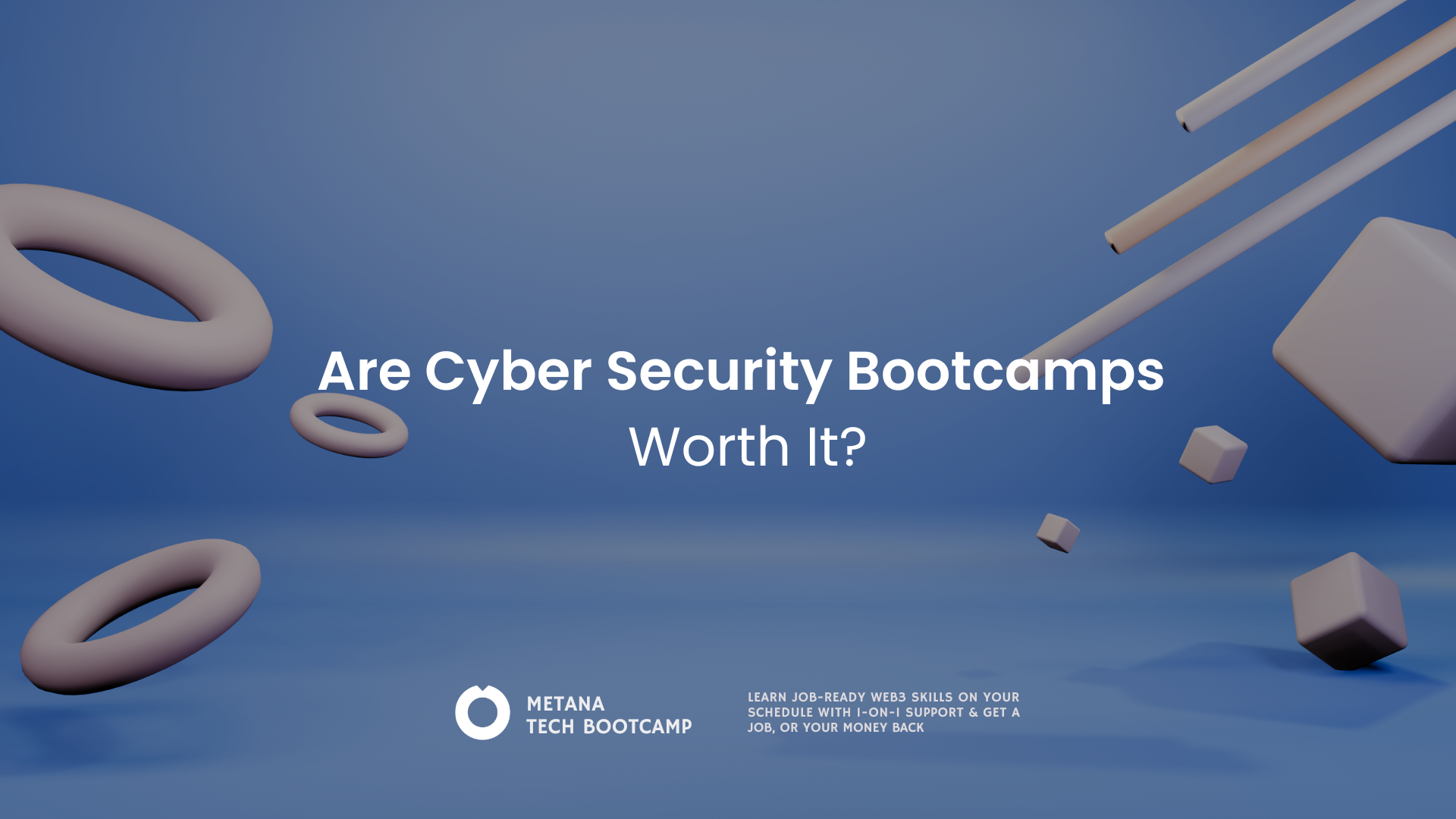Are cybersecurity bootcamps worth it? Yes — for beginners, a cybersecurity bootcamp can be a fast, practical way to enter the field. In just 12–30 weeks, you’ll gain hands-on skills in ethical hacking, network defense, and incident response — without spending years on a degree.
With cybercrime expected to cost businesses $13.8 trillion by 2028, companies are desperate for skilled pros. It promises job-ready skills in months, but they’re intense, pricey, and not all are worth your time.
In this beginner’s guide, we’ll break down how cybersecurity bootcamps work, what skills you’ll learn, real career outcomes, and which programs are best in 2025 — so you can decide if it’s the right path for you.
Cybersecurity Bootcamp Readiness Checklist
Is a Cybersecurity Bootcamp Right for You?
Download our beginner-friendly checklist to compare costs, outcomes, and skills — and decide if a bootcamp fits your career goals.
What Is a Cybersecurity Bootcamp?

A cybersecurity bootcamp is an intensive, short-term training program designed to equip you with practical skills and knowledge for a cybersecurity career. Unlike traditional degrees, a cybersecurity bootcamp is laser-focused and fast-paced, making it ideal for those eager to jump into the field quickly.
How a Cybersecurity Bootcamp Works
Most cybersecurity bootcamps last 12-30 weeks, offered online or in-person. You’ll tackle hands-on projects like stopping mock cyberattacks, securing networks, or analyzing vulnerabilities.
Expect to dedicate 40-60 hours a week to labs, coding, and studying. Many programs prepare you for certifications like CompTIA Security+ or Certified Ethical Hacker (CEH). It’s like training for a marathon you’ll be exhausted but ready to compete.
Who Should Join a Cybersecurity Bootcamp
A cybersecurity bootcamp is perfect for career switchers whether you are a software engineer or a someone in healthcare looking for a switch in career, recent grads, or tech enthusiasts with basic IT knowledge.
No degree? No problem. If you’re ready to fully commit, a cybersecurity bootcamp can launch you into a thriving field.
Why Choose a Cybersecurity Bootcamp?
The cybersecurity job market is booming, and a cyber security bootcamp is built for speed and impact.
Surging Demand for Cybersecurity Skills
Cybersecurity jobs are expected to grow 32% by 2032, with median salaries around $103,000 (U.S. Bureau of Labor Statistics). From startups to banks to government agencies, everyone needs protection against rising threats like ransomware and AI-driven attacks. The Canadian Anti-Fraud Centre estimates cybercrime losses could top $1 billion by 2028, making skilled pros essential.
Cybersecurity Bootcamp vs. College Degrees
A computer science degree takes 3-4 years and can cost $80,000 or more. A cybersecurity bootcamp? Done in months for $8,000-$20,000. It skips general education and zeros in on what employers want: hands-on skills like penetration testing or incident response. Plus, many offer career coaching, which colleges often lack.
Fast-Track to Practical Skills
A cybersecurity bootcamp focuses on real-world skills. You’ll work on projects mimicking actual cyber threats, like securing a cloud server or analyzing malware. This practical approach means you’re ready for entry-level roles like security analyst or SOC analyst right after graduation.
PRO TIP: Look for a cyber security bootcamp with a capstone project to show off your skills to employers.
The Downsides of a Cybersecurity Bootcamp
A cybersecurity bootcamp isn’t a magic fix. Here’s what could trip you up.
Costs and Time Demands
Tuition for a cybersecurity bootcamp ranges from $8,000 to $20,000, and full-time programs require 40+ hours a week. If you’re working, balancing both is tough. Financing options like loans or Income Share Agreements (ISAs) can help, but ISAs mean sharing your future salary. Part-time cyber security bootcamps exist but take longer.
Not All Cyber Security Bootcamps Deliver
Some cyber security bootcamps cut corners with outdated curricula or inexperienced instructors. Lighthouse Labs warns that unaccredited programs may overpromise job outcomes. A bad cybersecurity bootcamp can leave you with debt and no job.
Skills You’ll Gain in a Cybersecurity Bootcamp
A cybersecurity bootcamp loads you with skills employers are hunting for, both technical and soft.
Technical Skills for 2025
You’ll master:
- Network Security: Protect systems from intrusions.
- Ethical Hacking: Simulate attacks to test defenses.
- Incident Response: Handle breaches like a pro.
- Encryption and Coding: Secure data and write scripts.
- AI and Cloud Security: Counter 2025’s biggest threats, like AI-driven malware.
These align with industry needs as AI and cloud attacks surge.
Soft Skills Employers Value
You’ll also sharpen:
- Problem-solving under pressure
- Clear communication for team updates
- Attention to detail for spotting vulnerabilities
- Adaptability to evolving threats
These make you a top hire.
Certifications to Strengthen Your Resume
Many cybersecurity bootcamps prep you for certifications like:
- CompTIA Security+: Entry-level must-have.
- CEH: For ethical hacking roles.
- OSCP: Advanced, for penetration testers.
Certifications validate your skills and can boost your salary.
Real Graduate Experiences
What’s life like after a cybersecurity bootcamp? Let’s check the data and a real story.
Jobs and Salaries After a Cybersecurity Bootcamp
A 2024 Course Report study found 70% of cyber security bootcamp grads land tech jobs within 6 months, earning $80,000-$100,000 on average. Popular roles include:
- Cyber Security Analyst: $80,712 average salary.
- SOC Analyst: $62,722, monitoring threats.
- Incident Responder: $61,368, handling breaches.
- Security Researcher: $102,443, designing protocols.
Government, tech firms, and banks are hiring like crazy.
Is a Cybersecurity Bootcamp Worth the Investment?
Let’s talk numbers and options to see if a cyber security bootcamp pays off.
Cost vs. ROI Breakdown
A $15,000 cybersecurity bootcamp could land you a $90,000 job in 6 months. A degree might cost $80,000 and take 4 years for a similar salary. Here’s the breakdown:
| Option | Cost | Duration | Avg. Starting Salary |
|---|---|---|---|
| Cyber Security Bootcamp | $8,000-$20,000 | 3-6 months | $80,000-$100,000 |
| Degree | $80,000+ | 3-4 years | $90,000-$110,000 |
| Self-Study | $0-$2,000 | Varies | Varies |
If you land a job fast, the ROI is strong. If not, the cost hurts.
Alternatives to a Cybersecurity Bootcamp
- Self-Study: Platforms like TryHackMe or Cybrary cost $0-$2,000 but require serious self-discipline. Ideal if you’re motivated.
- Community Colleges: Offer affordable courses ($5,000-$10,000) but take 1-2 years.
- Online Courses: Udemy or Pluralsight provide flexible, budget-friendly options.
Funding Options to Reduce Costs
Some cybersecurity bootcamps offer scholarships or ISAs. For example, Lighthouse Labs partners with Upskill Canada to lower tuition to $3,500 for eligible students (down from $14,000). Look for government grants or employer sponsorships too.
[PRO TIP: Ask about funding options before enrolling to cut your costs.]
How to Choose the Best Cybersecurity Bootcamp
A great cybersecurity bootcamp can transform your career. A bad one? A waste of time and money.
Key Features to Prioritize
- Curriculum: Does it cover 2025 trends like AI and cloud security?
- Instructors: Are they industry pros with real-world experience?
- Career Services: Do they offer job placement, resume help, or employer connections?
- Reviews: Check Course Report or SwitchUp for honest feedback.
Red Flags to Watch Out For
Avoid cyber security bootcamps with:
- No transparency on job outcomes
- Outdated tools or curricula
- Pushy sales tactics
- Poor reviews or no accreditation
[PRO TIP: Reach out to alumni on X for unfiltered insights before signing up.]
Your Next Steps to a Cybersecurity Career
Ready to take the leap? Use our checklist to find the right cyber security bootcamp. Test your interest with free platforms like TryHackMe. Connect with cyber security pros on X to learn what employers want.
Ask yourself: Can you handle the intensity of a cybersecurity bootcamp? If the answer’s yes, it could be your fast track to a high-paying career. Start today…you’re closer than you think.
FAQs About Cybersecurity Bootcamps
1. Do I need tech experience for a cybersecurity bootcamp?
Basic IT skills help, but many cybersecurity bootcamps accept beginners. Check prerequisites first.
2. Will a cybersecurity bootcamp guarantee a job?
No guarantees, but 70% of grads land jobs within 6 months, especially with career support.
3. Are online cybersecurity bootcamps as effective as in-person?
Yes, if they include live instruction and hands-on labs. Compare reviews to choose wisely.
4. What certifications can I earn in a cybersecurity bootcamp?
Common ones include CompTIA Security+, CEH, and OSCP, all valued by employers.
5. Is a cybersecurity bootcamp better than self-study?
A cybersecurity bootcamp offers structure and support. Self-study is cheaper but demands discipline.







